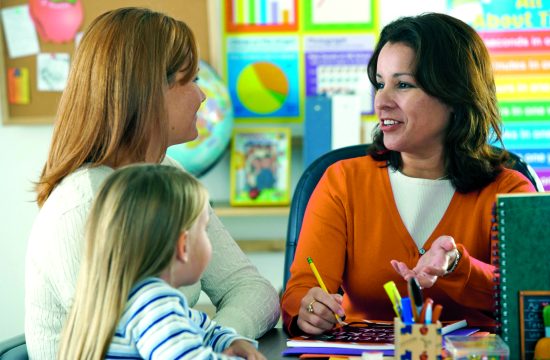Effective readers are grown, not born. All parents hope their child develops into an enthusiastic reader with a love of literature. Studies show that from our earliest days, children are acquiring language skills and learning how to read. The more children know about language and literacy before they arrive at school, the better equipped they are to be successful readers.
How can you help set your child up for reading success in school? The work begins at home. In fact, the American Academy of Pediatrics (AAP) recommends you start reading aloud to your child by at least 6 months of age, although many families start at birth. Below are six ways you can help your child develop early literacy and a life-long love of reading.
Talk to your child
It may seem obvious, but oral language development precedes written language skills. Talking to your children beginning at birth exposes them to language – and this is an important building block for early reading success. According to researchers, there is a strong correlation between a child’s academic success and the number of words their parents spoke to them at age three. Talk with your child about your day, share stories from work, and use interesting language. Name things that you see around you. These activitiesbuild vocabulary and an understanding of
how language works – important early reading skills!
Read to your child
Reading to your child is likely the single most important thing you can do as a parent to encourage your child’s reading readiness. Read to your child from their earliest days. Make a nightly routine of reading together, make sure your child has age-appropriate books available, and regularly visit libraries. Children who are read to daily thrive at home and at school.
Talk with your child about the books you read

As soon as they are ready, talk with your child about the books you are reading at home. Encourage discussion by asking about a picture in the book, pointing out an interesting detail, or asking your child what might happen next in a story. Interactively reading aloud is an important early language experience for young children. While reading aloud offers great benefits to growing readers, reading and discussing text offers significantly more potent benefits.
Play with language
Singing songs, saying riddles, and making up rhyming pairs can be fun ways to help your child develop early language skills. The sing-song rhymes of books like those from Dr. Seuss build phonological awareness in young children. When children have frequent pleasant experiences with words and text, they build a love not just for reading, but for exploring, learning, and thinking deeply.
Talk to your child’s teachers about the books they read at school
When it’s time to look for a school, be sure to find out if your child’s school is providing a linguistically rich learning environment filled with a large, varied selection of reading materials. Do the children have regular opportunities to read, listen to good reading, talk about reading, and write about reading? Be sure to ask about the books they are reading at school so you can have discussions about them at home with your child.
You read, too!
When you spend time reading – whether it’s a novel, magazine, or business journal – you lead by example. Our children imitate what we do, so ensure that your child sees you reading, hears you talking about what you are reading, and sees you writing about what you are reading. Choose books to order online, or visit the local library together.
The time you have at home together allows you to invite your child to a lifetime of learning. The above suggestions can be integrated into the normal course of your days together. There is no need to plan or design classroom type work at home. Simply build a linguistically rich environment filled with engaging books you enjoy together. With a foundation like this, your child is likely to thrive when he or she arrives at school. Don’t stop reading together when school begins; keep this up at home. Many children will allow family to read to them at bedtime even into their earlyteen years.








